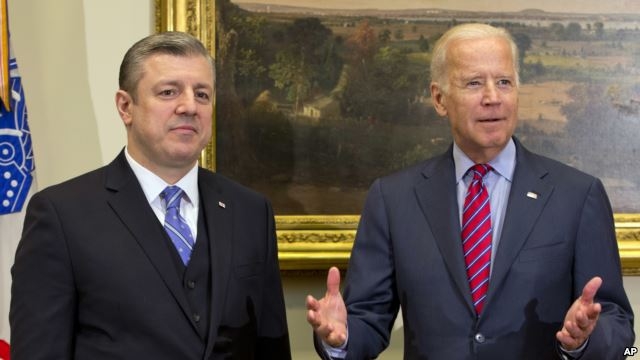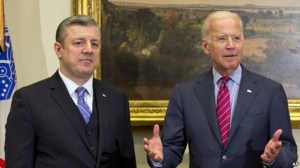Georgian PM in Washington, Vows to Continue Pro-Western Course
Georgian Prime Minister Giorgi Kvirikashvili was in Washington this week to meet US Vice President Joe Biden and the Chairman of the Senate Committee on Armed Services, John McCain, World Bank President Jim Yong Kim and Deputy Managing Director of the International Monetary Fund, Min Zhu.
The PM was accompanied by Foreign Minister Mikheil Janelidze; Economy Minister Dimitry Kumsishvili, and Georgian Dream lawmaker Tedo Japaridze who chairs the foreign affairs committee in the Parliament.
On Tuesday the up-coming elections and Georgia-Russia relations were touched upon, with the PM promising that his government would continue down its path towards Western integration and guaranteeing that free and fair parliamentary elections would be held when Georgians go the polls later this year.
Kvirikashvili, who took over as prime minister from his much-maligned successor Irakli Garibashvili in December 2015, reiterated that Georgia sees its future with the EU and NATO.
“There is a very clear will of (the) Georgian people ... to be pro-Western, pro-European,” Kvirikashvili told the AP on the sidelines of his ongoing trip to the US.
New robust trade and political agreements with Brussels and closer moves towards NATO membership have placed Georgia firmly in the group of former Soviet nations deeply opposed to the revanchist policies of Russian President Vladimir Putin.
Relations between Moscow and Tbilisi have been frozen since August 2008 when Russia invaded and fought Georgia in a brief, but bloody, five-day war. Russia’s far larger and better-equipped combat forces quickly overran Georgia’s American-trained military units and ended with both Abkhazia and South Ossetia declaring independence, backed by Russia’s vast military and financial support.
Kvirikashvili said his government wants to maintain an open line of communication with Moscow, but it will not accept Russia’s actions towards Georgia.
“This does not mean that we do not need to try to normalize relations with Russia, but not at the expense of Georgia’s territorial integrity and ability to make its own sovereign decisions,” Kvirikashvili said. “Our approach is designed to ‘cool down’ tensions to allow space for investment and moving West. In the face of fundamental existential challenges to our freedom and democracy, we remain democratic and dynamic.”
Kvirikashvili stressed Georgia has transformed itself from a country ravaged by civil war into a modern democratic state.
Politics was not the only topic of discussion during the PM’s visit to Washington, seeing him also talking with representatives of US investment funds, banks and other potential investors on the abovementioned investment climate.
Businessmen were told of the preferential business environment in Georgia and the benefits they would experience by investing there.
The Georgian PM highlighted Georgia’s achievements of recent years, claiming that his country’s investment attractiveness had improved thanks to a number of recent reforms. He assured his hosts that despite instability in the region, Georgia had managed to keep its economic growth and “all areas of the economy were stable and open to foreign investments.”
Georgia’s strategically important location was another advantage Kvirikashvili highlighted, and he explained how Georgia could increase its role as a transit corridor country.
He also discussed the new four-point reform plan which included new infrastructure plans, tax benefits, governance reforms and an overhaul of the education system, as a way to increase economic development.
GEORGIA TODAY












